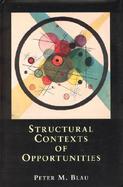Structural Contexts of Opportunities
- Binding: Hardcover
- Publisher: Univ of Chicago Pr
- Publish date: 10/01/1994
Description:
The distinguished sociologist Peter Blau has opened up a variety of fields with brilliant contributions, ranging from research on social networks of small groups and quantitative studies of formal organizations to more synoptic investigations of populations and the large-scale structures which hold them together. In this capstone to a prolific career, he has brought together these concerns to form a wide-ranging theory of population structures and their influence on social life - from opportunities in job choice and social mobility, to organizational participation, and intergroup relations. Blau begins by outlining the influences of population structures on intergroup relations and then examining the implications these influences have on occupational opportunities. He looks at the many groups within which an individual is likely to socialize - family, ethnic group, socioeconomic class - and the distance away from these groups an individual is likely to move. Blau demonstrates how such factors affect social mobility, which, in turn, influences membership and structures several types of organizations. Blau then moves on to interpersonal relationships and analyzes the social exchanges in them that reveal the ultimate effects of ethnic, socioeconomic, and other aspects of population structures. He defines two types of power: influence in direct interpersonal exchange, and large-scale domination (economic or political) of groups without personal contact. Finally, Blau explores recent historical changes in population structure in the United States and other developed countries, concluding with an analysis of the recent downturn in the U.S. economy and the consequent decline in opportunities.
Expand description
Product notice
Returnable at the third party seller's discretion and may come without consumable supplements like access codes, CD's, or workbooks.

Please Wait

